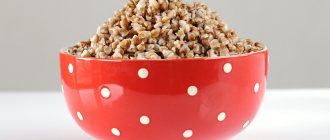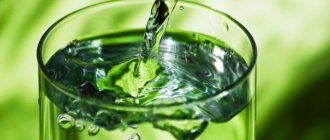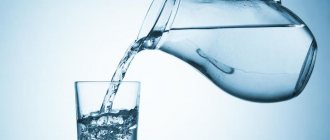Water fasting is an alternative medicine method that is perceived by many as a diet. Hunger is often used not for medicinal purposes, but for weight loss. Several methods of water fasting have been developed, varying in duration and procedures. To lose weight, without the goal of treatment, it is better to choose fasting that lasts a week - this is a good experience and preparation for longer periods.
CALCULATORS FOR THOSE WHO WANT TO LOSE WEIGHT
How long can you fast on water? Is it good or bad for your health? Let's find out from the article.
By the will of fate
Footballers and hockey players died from injuries and heart attacks, auto racing masters died in accidents on the highways, and boxers died in the ring. But there are stories that, even after many years, remain mysterious and inexplicable. Soviet Olympic champion Yulia Ryabchinskaya died at the peak of her career during a routine training session, which under no circumstances could have had similar consequences.
Article on the topic Deadly skid. The tragedy of Olympic champion Natalia Lavrova
A native of the village of Peschanka, Vinnytsia region, Yulia Babak did not think about a sports career. In my post-war childhood, I had completely different, much more modest dreams: to acquire a profession, to become a useful member of society. However, the girl danced well and after school tried to enroll in a circus school. But the admissions committee did not consider Yulia gifted enough, and she went to nursing courses.
During her training, the girl married paramedic Alexander Ryabchinsky , taking his last name. The whole sports world recognizes Julia under it.
She came, sat down and swam
At the age of 20, she once came to the rowing section out of curiosity. She was offered to sit in a kayak, Yulia agreed - and swam away. And very confidently, although she had never held an oar in her hands before. And later she admitted to the coaches that she didn’t even know how to swim.
Rowing captivated Ryabchinskaya, and her mentors were amazed at her progress. Julia fulfilled the standard for the title of Master of Sports of the USSR, which for some was the goal of her entire career, two months after the start of her studies. The girl trained with complete dedication and soon won the Big Dnieper Cup, gaining the right to compete at the championship of the Ukrainian SSR. But the Cup was her first performance at official competitions.
At the republican championship, a girl who had been rowing for only a few months took 2nd place. She went to the 1968 USSR Championships as a reserve.
Article on the topic
The mystery of the death of the running queen. Who killed Olympic champion Elena Romanova
The star of Soviet rowing at the time was Lyudmila Pinaeva , Tokyo 1964 Olympic champion. It is unlikely that at the All-Union Championship Pinaeva paid attention to Yulia, who literally devoured her with her eyes. And she certainly couldn’t think that very soon this girl would become her main competitor.
My review - fasting is good for weight loss!
The practice of using long, 48-hour fasts once a week provides excellent weight loss results. Firstly, it reduces the total calorie intake per week, and fat burning occurs precisely over long “distances” . Secondly, the process of autophagy is launched - intracellular cleansing and rejuvenation of the body , and thirdly, there is an excellent cleansing of the gastrointestinal tract system . From my own experience, I can say that in two months of being on the periodic (interval) fasting system, I achieved excellent results - minus 10.5 kilograms, largely thanks to the weekly practice of 48-hour fasting. This practice also made it possible to quickly accustom the body to the right foods by zeroing out insulin resistance, that is, the body stopped requiring carbohydrate, sweet foods for life - and began to calmly process fat into energy.
Rower with baby
Ryabchinskaya watched the games in Mexico City on TV. Pinaeva won her second gold medal in the women's single kayak competition. Julia continued to persistently improve her results.
Ryabchinskaya competed not only in singles, but also in doubles and fours. In 1971, Yulia qualified for the World Championships, joining the crew that participated in the fours competition.
Incredibly, all this happened at a time when Ryabchinskaya was pregnant. The coaches grabbed their heads, saying that she would derail her entire career, but Yulia objected: “I’ll give birth and have time to recover!”
Article on the topic
Plaster for the sake of bronze. Olympic boxing champion about the price of victory
She stopped training in the last months of pregnancy, gave birth to a healthy boy, and soon she was again racking up kilometers on a kayak. The husband brought the baby to the shore, and the athlete breastfed the baby right there, and then returned to preparation.
At the 1971 World Championships, the USSR team consisting of Ekaterina Kuryshko, Natalya Boyko, Lyudmila Pinaeva and Yulia Ryabchinskaya won the fours competition.
Water fasting: rules
Interested in water fasting? Of course, it’s impossible to carry it out in a hurry. Therefore, read the rules of the procedure to do everything correctly.
The first thing you must do is tune in to the procedure. For an unprepared person, the first experience of fasting may seem extremely difficult. Therefore, organize yourself in advance for the time that you will spend completely without food.
Photo: pexels.com: UGC
In fact, there is only one rule of fasting and it is very simple: you do not eat anything all day, but only drink water. It is important that the liquid is of high quality and at the correct temperature. Therefore, give preference to distilled or mineral water (unsalted and still). The liquid should be at room temperature, or at least warm. There are no restrictions on water consumption - drink as much as you want.
Pre-Olympic duel
Before the 1972 Olympics in Munich, a real fight broke out between Ryabchinskaya and Pinaeva for the right to participate in singles competitions. Of the six starts that were considered qualifying, three were won by Pinaeva, and three more by Ryabchinskaya. On the side of the first was experience and two victories at the Olympics, on the side of the second was youth, talent, colossal efficiency and the ability to perform in any weather. Yulia was a real “universal soldier”: she won in a headwind, when other athletes lost their best qualities.
Article on the topic
Save Nastya: doctors are fighting for the life of the Olympic champion from Russia
As a result, the coaching council decided: at the Olympics in Munich, Ryabchinskaya will sail in a single kayak, and Pinaeva, together with Ekaterina Kuryshko, will form a double crew. Looking ahead, I must say that this decision turned out to be one hundred percent correct.
Skeptics continued to doubt: as if Yulia, with her vigorous energy, would not “burn out” at the main start... But at the Games, Ryabchinskaya passed the qualifying rounds without any problems, confidently reaching the finals.
What water is best to use during therapeutic fasting?
The basic rules for drinking water during fasting are not very different from drinking water in everyday life. But if in ordinary life, in addition to water, there is also food, then during fasting, water is the only thing that enters our gastrointestinal tract for breakfast, lunch and dinner. Therefore, its properties during fasting should be treated with increased attention.
There are various types of water: distilled, well, spring, spring, artesian, mineral, heavy, melted, shungite, silicon, silver, gold, copper, relict, magnetic, living, dead, etc.
All of them have well-defined chemical, physical and biological properties that can be successfully used during fasting to achieve certain goals. But at the initial stage of mastering fasting, you must comply with three simple requirements for the quality of your drinking water.
First, the water must be clean.
During fasting, especially for beginners, the body experiences significant stress. He has to neutralize a lot of toxic substances that are formed in large quantities during the transition to internal nutrition, as well as fight various harmful substances that enter the blood during cleansing processes during fasting. Therefore, it is clean drinking water, consumed in sufficient quantity, that can significantly dilute all these harmful substances and help remove them from the body faster. On the contrary, water with various chemical additives can significantly worsen your condition during fasting. Therefore, during fasting, it is necessary to provide yourself with the purest water that you can get. This can be high-quality bottled water, water from proven springs, or specially prepared melt water. If you have to use regular tap water, be sure to pass it through a good filter and boil it.
The second rule is that the water must be soft.
An excess of salts in drinking water forces the body to spend extra energy on removing them, and also reduces the ability of water to dissolve toxic substances. In addition, water with an excess of substances dissolved in it often causes discomfort on the tongue and in the stomach. Therefore, try to drink only soft water with a low salt content. To soften water, you can use special filters and freeze the water. Boiling also helps reduce the salt content in water. Soft water includes melt water, structured water, protium water.
Purified soft water can be obtained in the following ways:
- Melt water
- ordinary tap water - stand for one night at room conditions and in the morning, carefully, without shaking, pour into a wide-necked vessel. Place it in the freezer / in winter you can put it outside /. After 5-7 hours, most of the water will freeze. The unfrozen brine will remain in the middle. It must be poured out and the ice melted, the water brought to room temperature and drunk during fasting. - Structured water
- ordinary tap water is left in a bucket for 8-10 hours, carefully drained without affecting the sediment, boiled and frozen. The unfrozen part with harmful impurities is drained. The remaining ice around the walls of the bucket needs to be thawed and we will get structured, environmentally friendly and safe water. - Protium water
can be obtained by placing a bucket of water outside for 3-4 hours in frosty weather. On warm days, use the refrigerator freezer. Then the water is poured into another bucket, and the ice formed on the walls of the thigh is thrown away. This operation is repeated two more times. The remaining water will be protium water. It is used for drinking instead of regular water to cleanse the body of toxins.
In some cases, for better removal of toxic substances during short periods of fasting - 1-3 days, it is possible to use distilled water.
Third, the water should be tasty.
During fasting, there is a significant change in taste sensations. And if in the first 2-3 days of fasting, due to severe intoxication, you are unlikely to be able to fully taste the taste of water, then as the body switches to internal nutrition by 5-7 days, changes in taste can be very significant. The water that you calmly consumed for a long time before fasting may turn out to be completely unsuitable in terms of its taste. And here everyone solves this problem in their own way. Some people like warm boiled water, some prefer cool water, and some only need melt water.
In addition, to give water additional beneficial properties, you can pass it through a magnetic funnel or place a magnet in it for 1.5-2 hours. Such magnetized water helps to better cleanse the body of harmful components and toxins.
And one more important rule for drinking water during fasting is that the water should not be cold. Excessively cold water can further increase the cooling of the body, which will lead to unnecessary waste of energy, hypothermia, cramps and worsening fasting.
Is it possible to drink hot water while fasting?
Many of us are accustomed to hot tea or coffee in everyday life, and using hot water during fasting is quite acceptable. This diversifies your taste sensations, warms you, and does not have any negative effect on the fasting process. But do not use too hot water for these purposes.
Compliance with these simple rules of water consumption can significantly improve the final results of fasting for therapeutic and health purposes.
And here is a description of other methods for preparing melt water at home - Six ways to prepare melt water
Training on the 13th
In January 1973, the rowers went to a training camp in Georgia, in the city of Poti. We trained on the Kaparche River, which is about 7 kilometers long. The river is narrow and shallow in most places, and no one would ever think that it could pose a danger to experienced athletes.
On January 13, training continued as usual. When there was about a kilometer left before returning to the rowing base, Ryabchinskaya increased the pace and broke away from the other athletes. Julia did this often, so no one was worried.
Article on the topic
"Return the biotrash reward." How the champion Maguchikh was greeted in Ukraine
She disappeared from sight, and a little later the rowers saw an overturned kayak ahead and a cap floating on the surface. That day, Ryabchinskaya forgot her cap at the hotel, and her coach, two-time Olympic champion Antonina Seredina, gave her hers.
At the beginning of her career, Yulia did not know how to swim, but then she learned, sometimes ahead of much more experienced swimmers. Therefore, at first no one believed that she could drown, as they say, out of the blue. They were looking for her on the shore, her name was...
What will happen to your body if you fast for 3, 7, 21 and 40 days?
Health
Watch the video if you are too lazy to read
Watch the video if you are too lazy to read
Today, the so-called water healing fasting is very popular, the essence of which is to completely refuse food and consume exclusively liquids (water).
Attitudes towards fasting are quite controversial. Many doctors are inclined to believe that hunger is a serious stress for the body, which can have an extremely negative impact not only on the physical, but also on the mental state of a person.
Adherents of therapeutic fasting, on the contrary, claim that this is an effective way to cleanse and rejuvenate the body, normalize the functioning of the gastrointestinal tract, and increase muscle tone.
Well, let's look at what external and internal changes fasting for 3, 7, 21 and 40 days will lead to.
Fasting 3 days
A three-day fast is considered the mildest and safest option for cleansing the body of waste and toxins.
On the first day of fasting
You should not expect significant changes in the body. Of course, you will feel hungry, but the supply of nutrients and energy is quite enough to not only overcome the desire to eat at least something, but also to complete daily tasks.
To relieve hunger and feel good, it is recommended to drink 250 ml of water every hour on the first day of fasting.
On the second day of fasting
, which is better to start with a glass of water and a morning walk, your vigor will undoubtedly decrease, and the feeling of hunger will clearly make itself felt. In addition, you may feel very thirsty. You can drink up to 2.5 liters of water per day.
Third day of fasting
will be marked by the appearance of nausea, weakness, unpleasant taste in the mouth, white coating on the tongue (in people with problematic health, the coating can be yellow, gray and even brown). Water will help relieve the above symptoms somewhat.
According to those who endured such a three-day fasting marathon (and not everyone can do this), the following changes occurred in their body:
- The body has been cleansed of toxins, waste and mucus.
- Excess fluid came out, resulting in swelling of the legs, arms and face.
- I managed to lose 1 to 3 kg of excess weight.
- The functioning of the gastrointestinal tract has normalized.
- Pain sensations (especially in the joints) have decreased significantly.
- The condition of the musculoskeletal system has improved.
Let's be objective and voice the negative consequences of a three-day fast, because of which many abandon this idea, fearing for their health.
- Tachycardia (increased heart rate to 120 - 140 beats per minute) and bradycardia (decreased heart rate below 60 beats per minute).
- Nausea and dizziness.
- Daytime sleepiness.
- Fast fatiguability.
- Irritability and aggressiveness.
- Headache.
Similar manifestations can appear both on the first and third days of fasting.
How could this happen?
Two hours later, divers arrived from Poti and, after examining the river bottom, discovered the body of the Olympic champion.
In the place where Ryabchinskaya died, the depth of Kaparcha is slightly greater than human height. Turning over in a kayak is a common thing for athletes, so no one could understand why Yulia was unable to cope with the situation.
Forensic experts said that the athlete’s lungs were dry: she did not choke, but died from suffocation caused by a severe spasm of the respiratory tract after falling into icy water.
Not everyone believed in the accident, but investigators were unable to find anyone’s malicious intent in this story.
Literally on the eve of her death, Yulia admitted to the coach that her family life was collapsing and a divorce was about to happen. Husband Alexander, after the death of his wife, behaved as strangely as possible: he refused an official funeral on the Walk of Fame in Odessa, but practically did not appear at her grave in his native village. And then he got caught trying to alter his son’s documents in order to cross out his dead wife from them.
Water fasting day: review. Results of fasting after 2 months
During my student years, I was a thin girl, and my weight did not exceed 55 kilograms. I could afford to eat whatever I wanted, day and night. They said about me “not good food for a horse,” which, naturally, flattered me. But it is known that with age, the body’s metabolism slows down, and by the age of 30 the scales began to gradually tip towards 65 kg.
Of course, it was an uncomfortable weight for me, the feeling of lightness and flexibility disappeared, and my belly and chubby cheeks appeared. In addition, I became pregnant that year and gained another 10 kilograms. And after giving birth, I came to the conclusion that if I couldn’t pull myself together in my 30s, then later I might no longer be able to do so (due to poor physical condition).
I have always been against diets, and I don’t accept playing sports for several hours a day. And then by chance I heard from a friend about therapeutic fasting (on water). He fasts once a year for 14-18 days, while losing 20 kilograms, strengthens the immune system, cleanses the body of waste and toxins, in other words, gets healthier.
I read a lot about therapeutic fasting on the Internet, studied reviews and decided to fast once a week for 24 hours on Thursdays (this day of the week is responsible for the liver). During the period of bearing a child, it was my liver, as my doctor said, that worked for me.
It was difficult to fast the first time. In the morning I did an enema (it is necessary to cleanse the body) and drank two glasses of purified water (store-bought, not boiled). By lunchtime I felt the urge to eat something, and it didn’t matter whether it was bread, cookies, soup or an apple. I really wanted to eat, but I drank water instead of food.
In the evening, my head started to hurt, although I usually get headaches extremely rarely (a couple of times a year). Tablets are strictly prohibited during fasting. If it’s really hard, you can dilute half a spoon of honey in warm water and drink it, but I got through it. There was terrible weakness and I was getting sleepy.
The next morning I broke the fast by drinking freshly squeezed carrot juice, diluted by a third with water, and a couple of hours later I ate buckwheat brewed with boiling water. For lunch I ate a salad of fresh cucumbers and tomatoes, dressed with vegetable oil. Important: no matter how long you fast, the same amount of time you gradually come out of fasting, without eating fatty, sweet, fried and unhealthy foods (containing E-supplements).
The next Thursday, the fast went much easier (no headaches and I wanted to eat much less). After another week, surprisingly, I began to feel the need to fast! Each fast I lost 2-2.5 kg. But the next day, when I started eating, I returned 700-800 g.
After two months of such fasting - in addition, I began to pump my abs in the morning and do 10-minute exercises, I lost 8 kg.
Now I weigh less than in my student years - 53 kilograms. My diet may seem extreme to some people, but therapeutic fasting is useful not so much for weight control, but for improving the health of the whole body. After all, it is when we are fasting that our body does not spend its time, energy and strength on digesting food, but takes care of itself, putting things in order!











